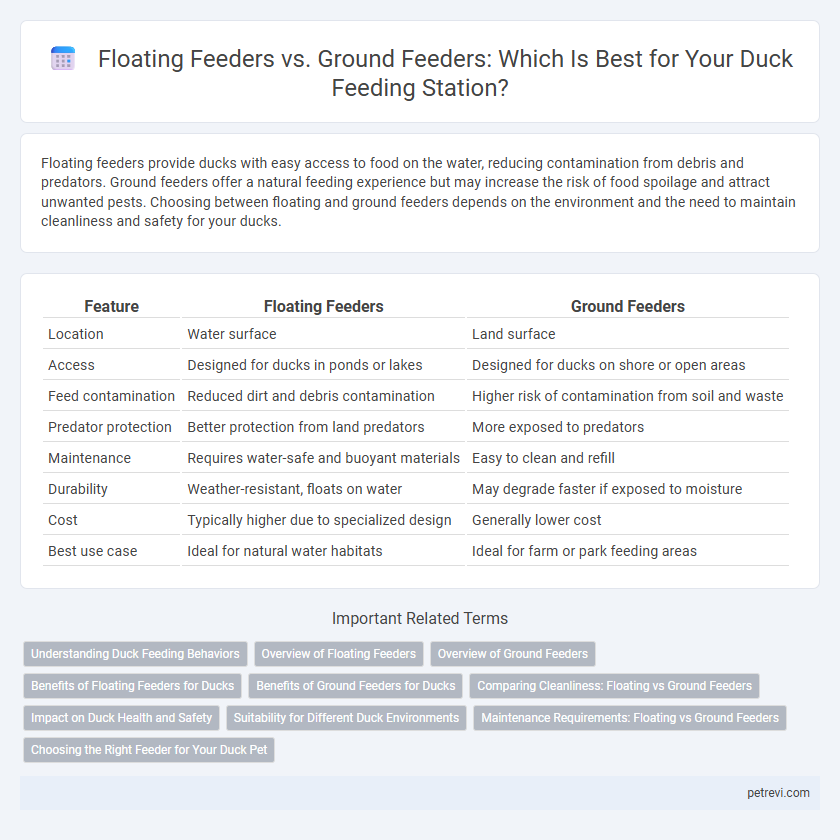Floating feeders provide ducks with easy access to food on the water, reducing contamination from debris and predators. Ground feeders offer a natural feeding experience but may increase the risk of food spoilage and attract unwanted pests. Choosing between floating and ground feeders depends on the environment and the need to maintain cleanliness and safety for your ducks.
Table of Comparison
| Feature | Floating Feeders | Ground Feeders |
|---|---|---|
| Location | Water surface | Land surface |
| Access | Designed for ducks in ponds or lakes | Designed for ducks on shore or open areas |
| Feed contamination | Reduced dirt and debris contamination | Higher risk of contamination from soil and waste |
| Predator protection | Better protection from land predators | More exposed to predators |
| Maintenance | Requires water-safe and buoyant materials | Easy to clean and refill |
| Durability | Weather-resistant, floats on water | May degrade faster if exposed to moisture |
| Cost | Typically higher due to specialized design | Generally lower cost |
| Best use case | Ideal for natural water habitats | Ideal for farm or park feeding areas |
Understanding Duck Feeding Behaviors
Ducks naturally prefer feeding in water, making floating feeders ideal as they mimic their natural foraging environment and reduce contamination from dirt and debris. Ground feeders, while easier to access, often lead to higher feed wastage due to spillage and exposure to predators. Observing ducks' preference for dabbling in shallow water highlights the importance of selecting feeding stations that align with their instinctive behaviors to promote healthier feeding habits.
Overview of Floating Feeders
Floating feeders for duck feeding stations provide an adaptive solution that minimizes feed contamination and waste by constantly adjusting to water levels. These feeders are designed with buoyant materials that allow feed to remain dry and accessible, promoting better feeding behavior and reducing the risk of mold and spoilage. Their efficiency in maintaining feed quality makes floating feeders an ideal choice for natural or artificial ponds with varying water conditions.
Overview of Ground Feeders
Ground feeders offer a natural feeding experience by allowing ducks to forage directly from the ground, mimicking their instinctive behavior. These feeders reduce feed waste through controlled release mechanisms and are ideal for various duck species, supporting healthy growth and nourishment. Maintenance typically involves regular cleaning to prevent mold and contamination, ensuring safe feeding conditions in outdoor environments.
Benefits of Floating Feeders for Ducks
Floating feeders provide ducks with cleaner, uncontaminated food by keeping feed above water, reducing waste and preventing mold growth compared to ground feeders. These feeders also minimize competition and aggressive behavior among ducks by allowing multiple birds to feed simultaneously in a spacious setup. Enhanced water hygiene and reduced predation risks make floating feeders an ideal choice for maintaining healthier, stress-free duck populations.
Benefits of Ground Feeders for Ducks
Ground feeders provide ducks with a natural foraging experience that encourages natural feeding behaviors essential for their well-being. These feeders reduce feed waste by keeping the food contained and accessible on solid surfaces, minimizing contamination from water or mud. Enhanced hygiene and ease of maintenance make ground feeders a practical choice for sustainable duck feeding stations.
Comparing Cleanliness: Floating vs Ground Feeders
Floating feeders for duck feeding stations maintain higher cleanliness by preventing feed contamination from dirt, mud, and water, reducing the risk of mold and bacteria growth. Ground feeders, while easier for ducks to access, often mix feed with debris and droppings, leading to increased feeding waste and potential health hazards. Choosing floating feeders enhances hygiene and feed quality, promoting better duck health and reducing maintenance efforts.
Impact on Duck Health and Safety
Floating feeders reduce the risk of contamination and disease transmission by keeping feed above water, minimizing contact with feces and debris. Ground feeders can expose ducks to harmful bacteria and parasites due to feed being mixed with dirt and droppings. Proper sanitation and feeder placement are crucial to maintain duck health and safety in feeding stations.
Suitability for Different Duck Environments
Floating feeders offer optimal suitability for waterfowl habitats such as ponds or lakes by keeping feed clean and accessible above water, reducing contamination and waste. Ground feeders are better suited for terrestrial or marshy environments where ducks naturally forage on land, providing easy access but requiring regular cleaning to prevent mold or disease. Selecting the appropriate feeder type enhances feeding efficiency, promotes health, and aligns with the ducks' natural behavior in their specific habitat.
Maintenance Requirements: Floating vs Ground Feeders
Floating duck feeders require less frequent cleaning since they minimize feed contact with water and debris, reducing mold and bacterial growth. Ground feeders are more prone to contamination from soil, droppings, and moisture, necessitating more regular maintenance to prevent feed spoilage and disease spread. Proper upkeep of floating feeders enhances feed hygiene and lowers the risk of waterborne pathogens in duck habitats.
Choosing the Right Feeder for Your Duck Pet
Floating feeders for ducks reduce water contamination and keep feed dry, enhancing hygiene and preventing waste. Ground feeders offer easy access and are ideal for controlled feeding environments but may attract unwanted pests and increase mess. Selecting the right feeder depends on your duck's habitat, with floating feeders preferred for ponds and ground feeders suited for enclosed or dry areas.
Floating Feeders vs Ground Feeders for Duck Feeding Stations Infographic

 petrevi.com
petrevi.com